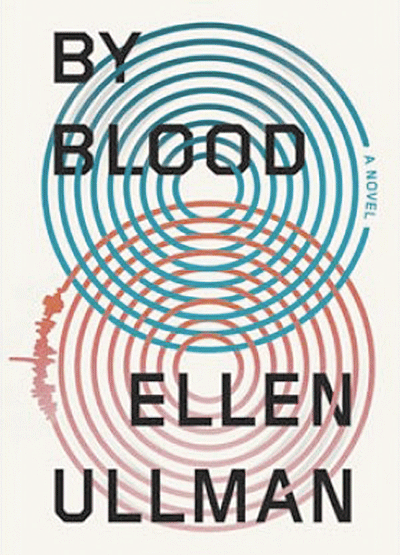By Blood
By Ellen Ullman
Farrar, Straus & Giroux , $27
“By Blood,” a literary inquiry into identity and legacy, is a gripping mystery — remarkable, considering that little more happens than a man eavesdrops on a woman’s therapy sessions taking place next door.
That man is a professor who has been placed on leave for possible improprieties with a student. He’s decamped to San Francisco and rented a dismal apartment and tiny office — it’s there that he begins listening to sessions of a particular patient.
“I did not cause her any harm,” he tells us in the book’s first line, a defensive dissimulation. Of course he’s hiding something — what exactly has he done?
The unnamed professor is beset by terrible thoughts; he imagines them as crows, descending on him with shrieking obsession. Now on the graying side of middle age, he carries a family history of madness and suicide, and his own depression, only glancingly understood, sometimes verges on the dangerously unwell. He’s familiar with psychiatric treatment, so he swiftly recognizes, and criticizes, the therapy he overhears.
“I was certain I had come in on her therapy at just the right moment, one of those mysterious fulcrum points: a pure, Aristotelian shift in the plot wherein the therapeutic story of the patient’s life was about to turn,” he says.
That patient, whom he comes to think of as his own, is at first looking for a break from her parents; he wants this too and latches on to her story. When she learns she’s adopted, he becomes even more obsessed with her. As the patient embarks on a quest to know who she is — which comes with startling revelation after startling revelation — she becomes an unwitting surrogate for the voyeuristic professor.
This is, yes, a little creepy. It is creepy that he leaves his light off and holds his body excruciatingly still so as not to give any hint that his office is occupied. It is creepy that he is titillated by her graphic tales of lesbian sex, that listening to her becomes his psychic balm, that when he decides to intercede in her search for her birth mother, he lies so easily and so well.
This is San Francisco in 1974, and though another person might be liberated and inspired, the professor sees only a world shot through with anxiety and chaos. The Zodiac Killer is on the loose, the war in Vietnam is collapsing, destitute men lurk on the sidewalks, and his apartment in North Beach is gray, run-down and literally at the end of the streetcar line.
With his erudition, vaguely adolescent, inappropriate sexual yearnings and formal, antique language, the professor is like a beaten Humbert Humbert, finally caught, 15 years later. He observes, he obsesses, he skulks.
The lobby of his office building is a respite of whiteness, clean and polished, with cherub decor — arriving, it’s as if he enters heaven. When a guard there begins dogging him, suspicions arise. Did he actually rent that office, or has he not told us the truth — is his very presence illicit?
Yet for all that unpleasantness, he never becomes unbearable. “I could pull her life over my head like a blanket cover (smothering, superseding, replacing) my own,” he says. In this, he is not unlike any reader, reaching for a story as comfort.
The patient’s story takes its first surprising turn when she discovers she is Jewish. Her response is almost shocking in its anti-Semitism. She’s an adoptee who, as an adult, wants to find greater belonging by discovering her true origins, then she’s ashamed of her heritage. She turns a latent prejudice into a reason for hating herself — good thing she’s in therapy.
Too bad her therapist is German.
The story of her therapist’s history also unfolds before the careful ear of the professor, who analyzes her analysis. The therapist too has parents whose legacy she would like to escape, a burden of history she doesn’t want to carry. As she smokes and listens, she wrestles with a European past in which her parents and her patients were on opposite sides.
Born in 1946, the patient’s path from Europe to the United States is many-layered and complex; being able to make this story with these rough outlines be packed with surprises is a testament to the imagination and plotting of author Ellen Ullman, who was once a computer programmer.
Send questions/comments to the editors.



Comments are no longer available on this story